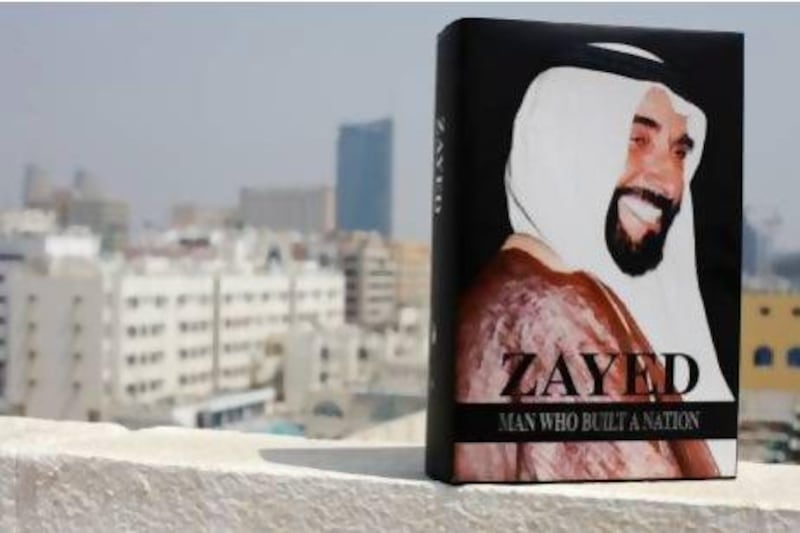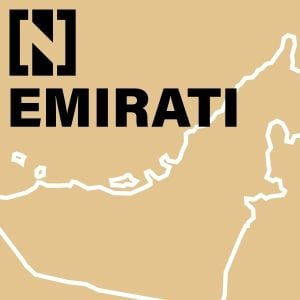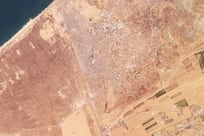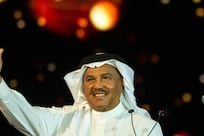ABU DHABI // “He had a great reputation among the Bedu. They liked him for his easy, informal ways and his friendliness, and they respected his force of character, his shrewdness and his physical strength.
“They said admiringly ‘Zayed is a Bedu. He knows about camels, can ride like one of us, can shoot, and knows how to fight’.”
So wrote the British explorer Wilfred Thesiger in his book Arabian Sands about his meeting with the late Sheikh Zayedduring his great expedition to the Trucial Coast in the late 1940s.
Thesiger was one of the first but Sheikh Zayed left an impression on all those who met him.
Many books and articles have been published highlighting various aspects and facets of "Baba Zayed".
They tell of the way the founding father of the UAE built a powerful and prosperous nation, his diplomatic endeavours and mediatory efforts, humanitarian projects abroad, the love and close relationship with his people and the timeless vision that continues to shape the UAE.
It is a story that continues to be written and revisited.
Last month saw the release of the latest book on him, Zayed: Man Who Built a Nation, published by the National Centre for Documentation and Research (NCDR).
This time the focus was on the collective memories of those who met and worked with him, including foreign dignitaries.
"A son of the desert, Sheikh Zayed never forgot the hardships and deprivations of the past," writes Sheikh Mansour bin Zayed,
Deputy Prime Minister, Minister for Presidential Affairs, and chairman of NCDR in the foreword of the book.
"It is my hope that access to Zayed: Man Who Built a Nation will promote not only my father's legacy as a great leader, but an understanding of what it means to be a proud Arab and a faithful Muslim. During his life, Sheikh Zayed remained all three."
Weighing more than two kilograms and at 734 pages long, the Dh200 book is epic in every sense.
It is filled with photos and statements from those he met, including sections dedicated to the history of Al Nahyan rule, Sheikh Zayed’s early years and his 33 years as a President of the UAE.
“Sheikh Zayed was viewed as a quiet, capable negotiator. It was a role in which he was adept,” said former French president Valery Giscard d’Estaing.
The former US president Jimmy Carter recalls: “There were a lot more occasions when Sheikh Zayed negotiated quietly and without any publicity.
“He never sought credit or approval for his diplomatic efforts. Yet he was tireless, even in the face of belligerence and bad faith among those he was trying to help.”
The book was put together through the efforts of researchers at NCDR who travelled abroad, and met and interviewed the different officials and persons whose lives and work had been affected by Sheikh Zayed.
“Using documented evidence and the recollections of statesmen and officials from all over the world, we paint the canvas of a diplomat who emerged, using his influence to avoid wars and avert catastrophes,” writes Graeme H Wilson, the book’s author.
“Also captured is the least known side of his life, a vast array of philanthropic acts that touched the lives of hundreds of millions of people around the world.”
It is six years since the NCDR published Zayed: From Challenges to Union, compiled by the historian Jayanti Maitra, who sifted through records held in British archives to build an in-depth portrait of Sheikh Zayed’s rise from desert prince to a world statesman.
In the latest book, the things Sheikh Zayed cared about and his reactions to events are brought to life through the testimonies of those closest to him.
One example was the early weeks after the union of the country on December 2, 1971.
It was a frantic time, as Sheikh Hamdan bin Rashid Al Maktoum recalls.
“Building federal ministries and structures from virtually nothing was an enormous responsibility, a huge burden … there were huge impediments and difficulties,” Sheikh Hamdan writes.
“Sheikh Zayed encouraged people to come to him with problems, but within the Cabinet there was a reluctance to do so as it would only add to his workload. He was very effective in all matters, but people only went to him as a last resort.”
The book traces the years and governance of Sheikh Zayed as he set the foundation for the country.
The federal budget for 1972 was 111.5 million Bahraini dinars (which Abu Dhabi had accepted as its official currency in 1966) and Sheikh Zayed had issued strict instructions on how the money would be used.
"The President made it clear that the UAE had higher priorities than building stylish ministry headquarters and funding its internal infrastructures," says Thani bin Essa, who served as Minister of Labour and Social Affairs in the first
Cabinet.
"He needed immediate results on the ground."
The book makes clear that education had a special place in Sheikh Zayed's heart.
“He had an open-door policy when it came to education,” says Dr Abdullah Taryam, Minister of Education between 1973 and 1979.
“He was very demanding, pressing for more schools, seeking a comprehensive higher-education system.”
At the time, plans for 51 new primary and secondary schools were announced by the Ministry of Education, comprising about 6 per cent of the national budget.
“The school-building programme was a vast investment when, at the time, there was much demand on federal funds,” says Dr Taryam.
Readers are also given a rare insight into the late President’s experiences and how he handled difficult times and tragic events.
After the hijacking in 1977 of a Lufthansa Boeing 737, “Sheikh Zayed issued strict orders that no hijacked aeroplane was ever to be allowed to land within the UAE”, the book notes.
That same year, Sheikh Mansour shared Sheikh Zayed’s shock over the assassination of his Minister of State for Foreign Affairs, Saif Ghobash, hailed at the time as one of the best and brightest stars of his generation.
“It was shocking to us,” says Sheikh Mansour. “There was no modern history of political violence here, much less political assassinations. Sheikh Zayed was shocked to the core by this.”
Readers and admirers of Sheikh Zayed also find out what was the late leader’s biggest disappointment.
"That he never saw an end to the misery of the Palestinians," says Sheikh Mansour. "He often spoke with regret that more had not been achieved and of the lost
opportunities.
“Perhaps no world leader had done more, both in the constant political process, in term of using his office to highlight the problems and the issues, and in philanthropic terms.”
The different sides and layers to the man who ruled for more than three decades is beautifully illustrated and captured through the people’s voices, thorough research and rare archives of images.
By 1990, Sheikh Zayed had been President for a term that had seen five US presidents, five British prime ministers, three popes, 15 Italian prime ministers, seven Indian prime ministers, three UN secretaries general and three World Bank presidents.
“Sheikh Zayed lived and ruled over such a span of time that he held within him an extraordinary knowledge, an encyclopaedia knowledge of modern world events and history,” said the former French president Jacques Chirac. “And he was often the one making that history.”
Zayed: Man Who Built a Nation, published in Arabic and English, is available from the NCDR bookshop for Dh200.






